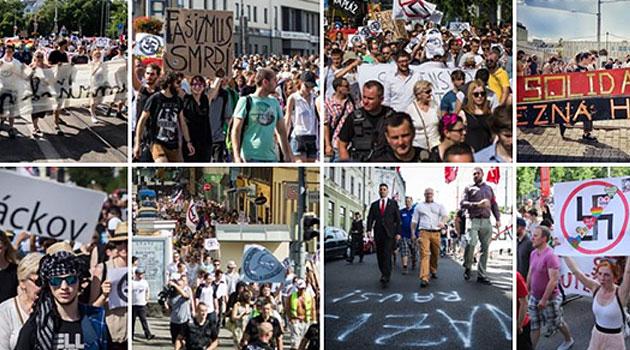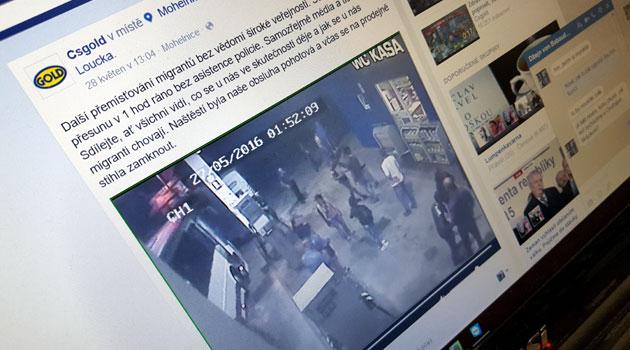Slovakia: Neo-Nazis assemble for hate demonstration, but many more counter-demonstrate against them

Hundreds of people participated in a neo-Nazi demonstration and march on Saturday, 25 June in Bratislava “against the dictatorship of Brussels and for
stopping the liquidation of Europe,” as well as a concurrent assembly by those opposed to extremism. More than 10 extremists were detained by police and taken to stations for questioning.
Fewer people than last year attended the demonstration by the ultra-right movements, and some of the demonstrators were from the Czech Republic. Many more people participated in the event against Fascism, which was also attended by politicians from various parties.
Last year as many as 3 500 neo-Nazis attended a demonstration profiled as against Muslims and assaulted unsuspecting passers-by who were watching a bicycle race ongoing at the same time – some extremists threw rocks at a family from Saudi Arabia who were out with their children. Police arrested as many as 140 people during last year’s demonstration, including several dozen Czech citizens.
This year the hateful event was attended by approximately 500 people, but more people attended the event against Fascism and carried signs with the Nazi swastika crossed out on them, for example. Online web portal Aktuality.sk reports that the counter-protest was attended by between 2 000 – 3 000 people, including former Slovak Prime Minister Iveta Radičová.
This year the neo-Nazis did not manage to spark any more serious conflicts, but police detained several of them anyway. After the demonstrations were over, police reported that local officers had taken 11 people in to police stations, most of them to give an explanation of their actions, and in two cases because they were suspected of having committed extremist misconduct.
Among those detained were, according to Slovak media, two representatives of ultra-right groups, apparently because they tore up an EU flag. One was the leader of the “Slovak Solidarity” (Slovenská pospolitost) party, Jakub Škrabák, and one was a co-organizer of the march, Marián Magát.
“The day is coming when we will take our homeland back into our own hands. Just as the British are now celebrating a date in June, the day when we take power into our own hands will be our independence day. Brexit is just the beginning. The bells are tolling for the European Union in this form,” declared Róbert Švec, the chair of the civic association “Slovak Revival Movement” (Slovenská hnutí obrody), to approximately 500 people at the assembly in the center of Bratislava.
Švec went on to say that Slovakia does not need “more Europe”, but needs more “resolute patriots”. Speakers at the rally expressed appreciation for the British voters’ decision in last week’s referendum to have their country leave the EU, and urged the Slovak Government to organize a similar plebiscite.
A petition calling for a referendum on Slovakia’s departure from the EU has been announced by the ultra-right party LSNS, which is seated in Parliament and did not support Saturday’s assembly and march. During the march, which was supervised by police and preceded by the assembly, ultra-right adherents shouted slogans such as “Slovakia for the Slovaks” and “Stop the Brussels dictatorship”.
The demonstrators included sympathizers of the Czech right-wing extremist Workers’ Social Justice Party (Dělnická strana sociální spravedlnosti). The former boss of the Republican Party in the Czech Republic during the 1990s, Miroslav Sládek, also addressed the crowd in a speech calling “for the unification of patriotic forces and the overthrow of Brussels.”
Slovak sociologist Fedor Gál, who was active during the Velvet Revolution in Slovakia, attended the counter-protest to express his disagreement with the extremists’ displays as they marched. “I am here for my father, who was murdered at the end of the war during a death march. I am here for my mother, who gave birth to me at Terezín. I would be ashamed to not come here,” he told the press.
